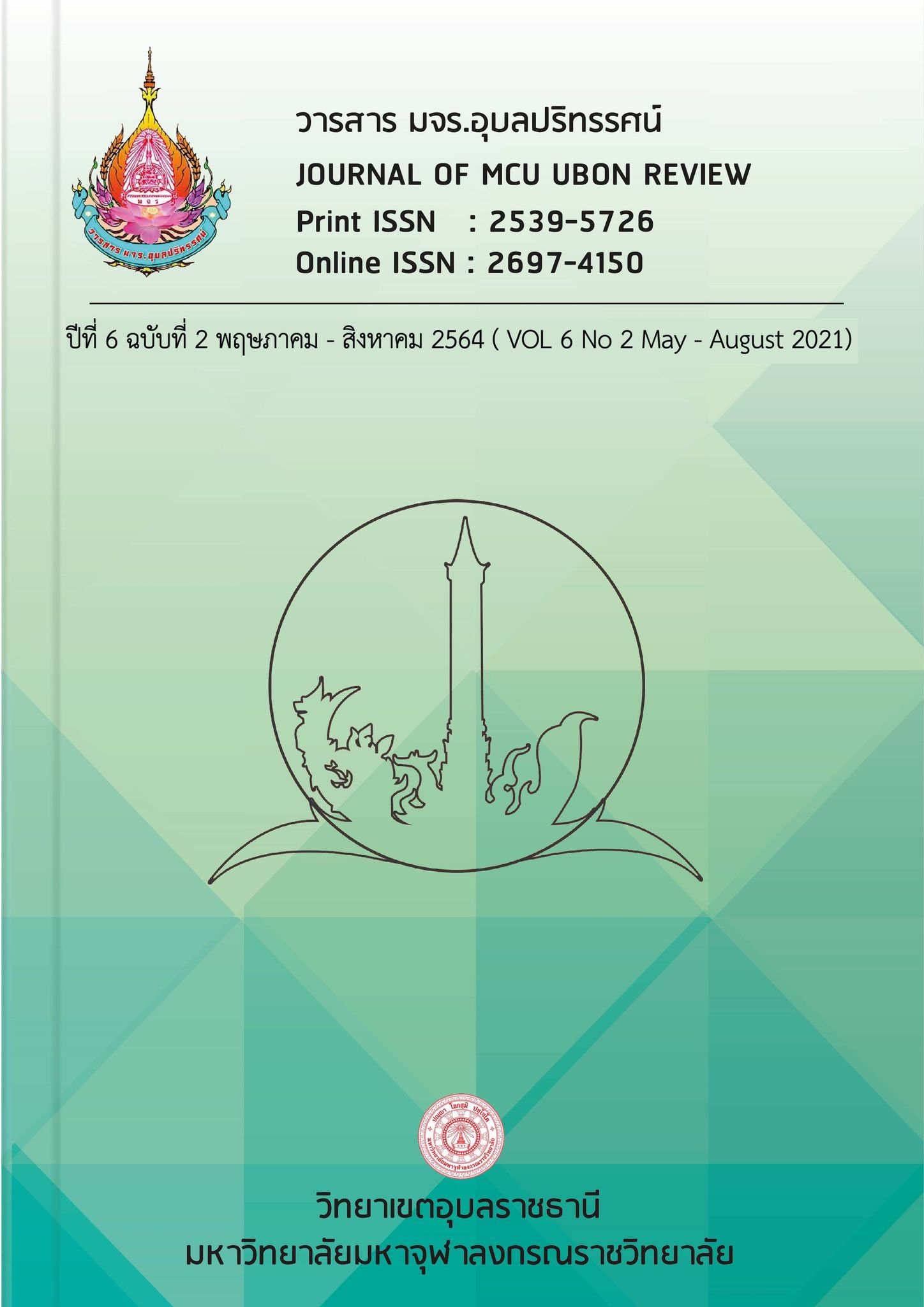The Effect of Integrated Buddhist Nursing Process to develop Positive Health Behaviors for people with HIV Receiving Medication by Mail during the COVID-19 Epidemic
Main Article Content
Abstract
The purpose of this research was to study the effects of integrated Buddhist nursing process for developing positive health behaviors of the people with HIV receiving medication by mail during the COVID-19 epidemic. It was a quasi-experimental research. The sample consisted of the people with HIV who received drugs by mail during the COVID-19 epidemic. The samples included 60 people selected though simple random sampling. The subjects were randomly assigned into the experimental group and control group with 30 persons in each group. Descriptive statistics were used for general information and t-test hypothesis was used with 2 related groups and 2 independent groups. The result of the research showed that the integrated Buddhist nursing process was able to develop positive health behaviors with statistical significance at the level of .05
Article Details
References
ดุษฎี กวนคอนสาร. (2553). พฤติกรรมสุขภาพผู้ติดเชื้อเอชไอวี/ผู้ป่วยเอดส์ที่ได้รับยาต้านไวรัสเอชไอวีตั้งแต่ 1 ปีขึ้นไป. บัณฑิตวิทยาลัย: มหาวิทยาลัยขอนแก่น.
ยุทธชัย ไชยสิทธิ์. (2553). พฤติกรรมสุขภาพผู้ติดเชื้อเอชไอวี/ผู้ป่วยเอดส์ที่ได้รับยาต้านไวรัสเอชไอวีตั้งแต่ 10 ปีขึ้นไป. บัณฑิตวิทยาลัย: มหาวิทยาลัยขอนแก่น.
พระพรหมคุณาภรณ์ (ป.อ.ปยุตฺโต), (2555). กายหายไข้ใจหายทุกข์. พิมพ์ครั้งที่ 53. นครปฐม: วัดญาณเวศกวัน.
มหาจุฬาลงกรณราชวิทยาลัย. (2539). พระไตรปิฎกภาษาไทย ฉบับมหาจุฬาลงกรณราชวิทยาลัย. กรุงเทพฯ : โรงพิมพ์มหาจุฬาลงกรณราชวิทยาลัย.
ลัดดา พลพุทธา. (2553). พฤติกรรมสุขภาพผู้ติดเชื้อเอชไอวี/ผู้ป่วยเอดส์ที่ได้รับยาต้านไวรัสเอชไอวีตั้งแต่ 5 ปีขึ้นไป. บัณฑิตวิทยาลัย: มหาวิทยาลัยขอนแก่น.
วัฒนา พลชาติ. (2553). ศึกษาวิเคราะห์วิธีการพัฒนาปัญญาตามแนวคิดของพระพรหมคุณาภรณ์ (ป.อ.ปยุตฺโต). บัณฑิตวิทยาลัย: มหาวิทยาลัยจุฬาลงกรณมหาวิทยาลัย.
วันวิสาข์ ทิมมานพ. (2559). กระบวนการพุทธจิตวิทยาการปรึกษาเพื่อพัฒนาพฤติกรรมสุขภาพเชิงบวกของผู้ติดเชื้อเอชไอวีโรงพยาบาลนพรัตนราชธานี, บัณฑิตวิทยาลัย: มหาวิทยาลัยมหาจุฬาลงกรณราชวิทยาลัย.
อายุษกร งามชาติ. (2554). การบูรณาการหลักพุทธธรรมเพื่อเป็นเครื่องมือในการปรับเปลี่ยนภาวะบกพร่องทางความรัก. บัณฑิตวิทยาลัย: มหาวิทยาลัยจุฬาลงกรณมหาวิทยาลัย.
เอื้อมอร ชลวร. (2553). การพัฒนาปัญญาในพระพุทธศาสนาเถรวาท. บัณฑิตวิทยาลัย: มหาวิทยาลัยจุฬาลงกรณมหาวิทยาลัย.
อุทิศ สุภาพ. (2563). COVID-19. สืบค้นเมื่อวันที่ 22 มีนาคม 2563 จาก https://www. matichon.co.th/article/news_2073848.
EOC-DDC Thailand. (2563). โรคติดเชื้อไวรัสโคโรนา 2019. สืบค้นเมื่อ 26 เมษายน 2563 จาก https://ddcportal.ddc. moph.go.th/Z26.
Collins O. (2013). Airhihenbuwa et al. “Why Culture Matters in Health Interventions: Lessons From HIV2AIDS Stigma and NCDs”, Health Education & Behavior.
Li, Xianhong. et al. (2011).Stigma Mediates the Relationship Between Self-Efficacy, Medication Adherence, and Quality of Life Among People Living with HIV/AIDS in China, American Journal of Plublic Health, October.


